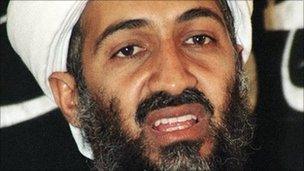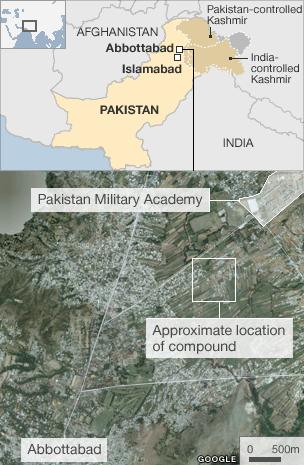Osama Bin Laden, al-Qaeda leader, dead - Barack Obama
- Published
- comments
Footage from inside Bin Laden's compound
Al-Qaeda leader Osama Bin Laden has been killed by US forces in Pakistan, President Barack Obama has said.
Bin Laden was shot dead at a compound near Islamabad, in a ground operation based on US intelligence, the first lead for which emerged last August.
Mr Obama said US forces took possession of the body after "a firefight".
Bin Laden is believed to have ordered the attacks on New York and Washington on 11 September 2001 and a number of others.
He was top of the US' "most wanted" list.
DNA tests later confirmed that Bin Laden was dead, US officials said.
Bin Laden was buried at sea after a Muslim funeral on board an aircraft carrier, Pentagon officials said.
Announcing the success of the operation, Mr Obama said it was "the most significant achievement to date in our nation's effort to defeat al-Qaeda".
The US has put its embassies around the world on alert, warning Americans of the possibility of al-Qaeda reprisal attacks for Bin Laden's killing.
CIA director Leon Panetta said al-Qaeda would "almost certainly" try to avenge the death of Bin Laden.
Crowds gathered outside the White House in Washington DC, chanting "USA, USA" after the news broke.
US Secretary of State Hillary Clinton said the operation sent a signal to the Taliban in both Afghanistan and Pakistan.
"You cannot wait us out, you cannot defeat us, but you can make the choice to abandon al-Qaeda and participate in a peaceful political process," she said.
And she said there was "no better rebuke to al-Qaeda and its heinous ideology" than the peaceful uprisings across the Arab world against authoritarian governments.
Compound raided
Bin Laden, 54, approved the 9/11 attacks in which nearly 3,000 people died.
He evaded the forces of the US and its allies for almost a decade, despite a $25m (£15m) bounty on his head.
Mr Obama said he had been briefed last August on a possible lead to Bin Laden's whereabouts. He authorised the operation last week once he determined there was enough intelligence to take action.
"It was far from certain, and it took many months to run this thread to ground," Mr Obama said.

Bin Laden was top of the US "most wanted" list
On Sunday, US forces said to be from the elite Navy Seal Team Six undertook the operation in Abbottabad, 100km (62 miles) north-east of Islamabad.
US officials said Bin Laden was shot in the head after resisting.
Mr Obama said "no Americans were harmed".
US media reports said that the body was buried at sea to conform with Islamic practice of a burial within 24 hours and to prevent any grave becoming a shrine.
Giving more details of the raid, one senior US official said a small US team conducted the attack in about 40 minutes.
Three other men - one of Bin Laden's sons and two couriers - were killed in the raid, the official said, adding that one woman was also killed when she was used as "a shield" and two other women were injured.
One helicopter was lost due to "technical failure". The team destroyed it and left in its other aircraft.
One resident, Nasir Khan, told Reuters the helicopters had come under "intense firing" from the ground.
The size and complexity of the structure in Abbottabad "shocked" US officials.
It was surrounded by 4m-6m (12ft-18ft) walls, was eight times larger than other homes in the area and was valued at "a million dollars", though it had no telephone or internet connection.
The US official said that intelligence had been tracking a "trusted courier" of Bin Laden for many years. The courier's identity was discovered four years ago, his area of operation two years ago and then, last August, his residence in Abbottabad was found, triggering the start of the mission.

Another senior US official said that no intelligence had been shared with any country, including Pakistan, ahead of the raid.
"Only a very small group of people inside our own government knew of this operation in advance," the official said.
The Abbottabad residence is about a kilometre from the Pakistan Military Academy - the country's equivalent of West Point or Sandhurst.
The BBC's Aleem Maqbool in Abbottabad says it will undoubtedly be a huge embarrassment to Pakistan that Bin Laden was found not only in the country, but also on the doorstep of the military academy.
He says residents in the town were stunned the al-Qaeda leader had been living in their midst.
The senior US official said the "the loss of Bin Laden puts the group on a path of decline that will be difficult to reverse".
Bin Laden's probable successor, Ayman al-Zawahiri, was "far less charismatic and not as well respected within the organisation", according to reports from captured al-Qaeda operatives, the official said.
However, the root causes of radical Islam - the range of issues that enabled al-Qaeda to recruit disaffected young Muslims to its cause - remain, for the most part, unaddressed, Islamic affairs analyst Roger Hardy told the BBC.
"The death of Bin Laden will strike at the morale of the global jihad, but is unlikely to end it," he warned.
'Momentous achievement'
World leaders welcomed the news of Bin Laden's death.
US President Barack Obama gives a statement confirming the death of Osama Bin Laden
Afghan President Hamid Karzai said Bin Laden had "paid for his actions".
Pakistani Prime Minister Yusuf Raza Gilani said the killing was a "great victory" but added that he "didn't know the details" of the US operation.
Former US President George W Bush described the news as a "momentous achievement".
"The fight against terror goes on, but tonight America has sent an unmistakable message: No matter how long it takes, justice will be done," Mr Bush said in a statement.
But a spokesman for the Pakistani Taliban threatened revenge attacks against the "American and Pakistani governments and their security forces".
In Gaza, which is governed by militant group Hamas, Prime Minister Ismail Haniya condemned the killing of "a Muslim and Arabic warrior".
BBC security correspondent Frank Gardner says that, to many in the West, Bin Laden became the embodiment of global terrorism, but to others he was a hero, a devout Muslim who fought two world superpowers in the name of jihad.
The son of a wealthy Saudi construction family, Bin Laden grew up in a privileged world. But soon after the Soviets invaded Afghanistan he joined the mujahideen there and fought alongside them with his Arab followers, a group that later formed the nucleus for al-Qaeda.
After declaring war on America in 1998, Bin Laden is widely believed to have been behind the bombings of US embassies in East Africa, the attack on the USS Cole in Yemen in 2000 and the attacks on New York and Washington.